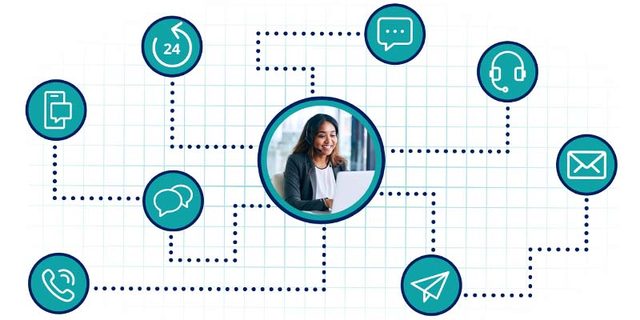Artificial intelligence (AI) is no longer a futuristic concept, but a reality that is radically reshaping the world of business. Capable of analyzing vast amounts of data, making decisions, and performing tasks autonomously, AI has found its place in various business functions, including customer service, where it holds the power to deliver significant value. As customer expectations continue to soar, companies are turning to AI-powered solutions to streamline processes and enhance customer and agent experiences.
What is AI in customer service?
AI in customer service can perform tasks that normally require human intelligence, such as understanding conversations, making decisions, and learning from data. For contact centers, AI offers an abundance of practical applications that can drive significant business outcomes, because it can automate manual tasks as well as guide agents through their work.
How AI can improve customer service
In the world of customer service, AI brings a wealth of benefits. AI can increase efficiency and reduce cost by assisting agents, automating manual work, and empowering customers to resolve issues using contextual self-service. And it can boost employee retention through improved agent experiences. AI can also increase customer lifetime value (CLV) by enabling seamless, personalized customer experiences that drive greater loyalty and revenue opportunities.

Exploring how AI can help your contact center
There has been a lot of buzz surrounding AI recently – especially with the explosion of generative AI – and many contact center leaders are feeling the impulse to throw themselves head first onto the AI train. However, as Pega’s Peter van der Putten points out in The AI Manifesto, “AI without action is a science experiment with no path to value.”
"AI without action is a science experiment with no path to value."
The first step toward AI adoption involves identifying the business outcomes you would like to achieve. Think about what problems you would like to solve or what opportunities you would like to seize. Likely there is an AI-powered capability that can help you realize your goals. For example, most contact centers struggle with agent attrition. Leveraging AI tools to train agents and guide them through their work presents a golden opportunity for enhancing the agent experience, increasing employee retention, and reducing costs.
The challenges of AI in customer service
After you identify the right technology for achieving your business outcomes, there are other challenges that need consideration. Can your contact center feasibly implement this technology in a way that provides value and a healthy long-term ROI? Is your organization ready for this AI capability? Before going ahead with an implementation, you will need to assess:
- The readiness of your data, in terms of availability, quality, and security. Can you leverage the right data about customers and their journeys in a complete and secure way? Can your organization run private AI models trained on your own data?
- The readiness of your technology and infrastructure. Can the AI technology integrate with your existing systems without causing bad user experiences? If the AI-powered technology builds momentum, will it be able to scale up to meet demand?
- Any legal, regulatory, governance, compliance, ethical, or social concerns that the AI technology may bring in its stead. Will the AI technology be transparent and ethical? Does the technology practice responsible AI? Does it follow a human-centric approach? Most likely, your organization’s legal and compliance department will need to sign off on your project to ensure that your use cases exercise responsible AI.

Balancing human and machine roles
The social implications of AI point to another challenge. How will you balance human and machine roles? Contact center agents still play an essential role in providing empathy, creativity, and judgment. Pega emphasizes the importance of human oversight when working with AI and views AI as a way to enhance human decision-making rather than replace it. In your AI-implementation plans, define roles and expectations for AI and live agents. When should they work together or apart? What situations require human oversight? If AI is done right, it can have a positive transformational effect on the way your contact center employees work. AI has the power to augment human capabilities and make every agent your best agent.
However, employees may fear that AI adoption could lead to increased surveillance, disempowerment, and job loss. The initial stages of your AI project will involve ensuring employee buy-in, which will prove critical to the project’s success. For example, Elevance Health included their agents as key stakeholders in their Voice AI project, eliciting their feedback and gaining acceptance, which resulted in overall positive feedback and massive adoption. In the words of Elevance’s Jenn Wade, “By letting them have a voice, our associates were part of the process. This wasn’t done to them; they helped.”
“By letting them have a voice, our associates were part of the process. This wasn’t done to them; they helped.”
Finding the right AI solution
After navigating all the potential challenges associated with implementing new AI capabilities, your search will begin for the right AI solution and, possibly, the right partners to help you on this journey.
AI solutions should align with your organizational needs and goals. Look at various factors, such as functionality, usability, security, cost, support, and reliability. Does the solution enable you to transform without disruption? Pega allows you to keep your existing systems and data where they are, enabling smooth AI adoption processes. Has this company been creating AI solutions for decades or are they capitalizing on the recent excitement in the market? Pega has been built purposefully with AI and automation at its core and recent advances, such as generative AI, forming part of a larger AI ecosystem that delivers intelligence to all aspects of business.
As AI capabilities develop at an exponential pace, it’s wise to keep an eye on the horizon. After deploying your AI solution, what do you envision next? Will your AI solution accommodate future possibilities for your contact center? Will the vendor’s solution grow and adapt to rapid change?

How AI is used in customer service
Planning for AI solutions can be overwhelming. However, you can take incremental steps that can quickly translate into improved agent and customer experiences as well as substantial cost savings.
Before you consider harvesting the full tree, focus on the low-hanging fruit. You can realize benefits quickly by leveraging AI to assist your agents. With Pega, AI can intelligently guide agents through their interactions so they can focus on delivering exceptional service.
Some specific examples of how AI improves agent performance include:
- Guidance. AI can guide your agents through their interactions, ensuring a seamless experience in which agents always know what to do next. For example, AI can understand a customer’s intent and automatically suggest a case workflow to guide the journey to completion. AI can also understand when to surface the right knowledge article – giving the agent immediate expertise and increasing their chances of resolving the case on first contact. Holding the power to boost customer lifetime value, AI can also guide agents with next best actions, such as personalized retention, nurture, or upsell offers.
- Summaries. Distilling information into easily consumable summaries presents a huge win for agent productivity. For example, before engaging, agents can review an AI-generated summary that includes all critical customer relationship information, which provides all the details needed to deliver highly personalized and effective service. AI can also summarize all important information relating to a customer interaction, eliminating time-consuming notetaking and wrap up activities. These summaries also prove valuable when transferring the case to another agent, who can quickly review the case details and hit the ground running.
- Training. Virtual and augmented reality are transforming training across industries, providing simulations for skilled trades, medical professionals, first responders – essentially any highly-skilled profession involving critical situations where workers need to operate competently from day one. For your frontline agents, generative AI can produce simulations that replicate the complexities of real-life customer interactions. These simulations not only replicate natural human conversations complete with varying attitudes and language styles, they also create tasks for the agent to complete. At the end of the interaction, the simulator provides detailed feedback about the agent performance, along with tips for improvement.
- Coaching. AI can boost agent performance through dynamic coaching and script adherence capabilities. Analyzing an agent’s conversation, AI can provide immediate feedback, guiding the agent back to the established script. In the near future, we can expect these coaching methods to develop even further, leveraging AI to provide contact center operations teams with scoring and feedback for every interaction, based on multiple factors, including tone, customer sentiment, and SLA adherence.
- Communications. AI can recommend responses for voice, enabling on-brand communications that adhere to best practices and compliance standards. AI can also cut down on composition time by providing ready-to-go responses for live chat, messaging channels, and email. Adding an extra layer of human judgement to this process, agents can accept, reject, or edit these responses. Also, when an agent manually composes a message, generative AI can suggest improvements to tone and readability, enabling superior communications. A gamechanger for multinational corporations, AI also enables agents to surpass language boundaries through real-time bi-directional translation, empowering agents to serve a broader customer base.
Of course, improved agent performance translates into improved customer service. When AI boosts an agent’s performance, both agent and customer alike benefit from this enhanced experience. However, apart from assisting agents with customer interactions, AI can also work behind the scenes, automating work and improving processes. Some practical examples include:
- Analyzing data and making decisions normally carried out by back-office specialists (such as waiving fees or approving a claim). These AI-powered decisions enable straight-through processing, which results in faster resolutions and superior customer experiences.
- Automating work out of the contact center with virtual agents, such as chatbots, IVR bots, and email bots. With virtual agents, customers can use natural conversation to self-solve and self-resolve on their own time. Virtual agents also integrate with Pega’s automated workflows, enabling customers to complete their own self-service cases. In situations requiring a human touch, virtual agents can escalate to a live agent, who has full visibility into the self-service case and can quickly pick up where the customer left off.
- Discovering new ways of optimizing service case processes and accelerating customer journeys. Pega Process AI can proactively find ways to improve your service workflows, automatically predict and avoid SLA breaches, preemptively address service issues, and route work more effectively.
Some of the practical applications of customer service AI outlined here are easy to implement and can quickly provide value. For example, generating automated interaction summaries using the Pega Customer Service™ agent desktop is as easy as flicking a switch and it offers a compelling ROI. When you consider that agents spend 13.5% of their time on post-call wrap-up activities, the cost benefits gained by automated interaction summaries are sizeable. For contact centers, it’s a quick and easy win.

AI: Alive and well, living in the contact center
With AI decisioning and workflows built into its DNA, Pega is uniquely positioned to fully harness new AI-powered technologies as they emerge. Organizations that work with Pega have been leveraging AI to improve customer service and business operations, with positive results.
Elevance Health leverages Pega Voice AI to enhance the agent experience: recommending specific case workflows, providing dynamic scripts, confirming script adherence, suggesting relevant knowledge articles, and automatically completing forms. AI assistance has reduced the complexity of the agent experience, enabling agents to focus on delivering highly empathetic service for members when they need it the most. The insurance provider has also harnessed Pega’s AI to help process one million claims per day, resulting in faster reimbursement and improved member satisfaction.
Aflac, a U.S.-based insurance provider, delivers intelligent self-service over multiple chatbots, which handles 77% of inquiries and saves $4 million per year. The company also leverages Pega Email Bot to resolve 30% of inquiries and automatically process the remaining inquiries – assigning service cases to the emails and routing them to the correct person for action. Live agents receive AI assistance which automates notetaking and after-call work. The company also uses AI decisioning to automate business processes, such as underwriting, substantially reducing manual work.
Electricité de France (EDF) recognized AI as an opportunity to protect and grow their revenue. Through self-service journeys, the utilities company generates personalized quotes based on gas consumption, leveraging AI-powered hyper-personalization to increase offer acceptance. Prospects can also contact an advisor, who receives AI-powered assistance with upsell opportunities generated through Pega’s AI-decisioning engine. The company has seen a 57% increase in upsell, exceeding their original business goal.
The future of customer service AI
Despite the loss of human agency and general doom prophesied by AI critics, the future of customer service AI remains bright. AI enables organizations to provide faster, smarter, and more personalized service to their customers across various channels and touchpoints. AI can also empower organizations to innovate, optimize, and transform their customer service processes, capabilities, and outcomes. In customer service settings, AI offers the most value where it assists agents through guidance, training, coaching, and automating manual tasks. Essentially, AI holds the power to make every agent your best agent.
However, this is uncharted territory, and your AI project will need tight collaboration and strong change management practices to bring it to fruition. In the words of Geeta Wilson, CTO of Elevance Health:
“We learn through this process because, let’s face it, this technology has never been deployed ever before. We’re in the middle of a technology revolution. We’re about to go into a realm [where] what you have right now is just going to be amplified in terms of your practices with change management, training, and operational connectivity with your partners.”
Be brave and roll up your sleeves. The world of customer service AI is fast upon us. It presents us with a wealth of opportunities for enhancing the agent experience and, by extension, provides seamless, personalized, empathetic service. Learn more about how Pega’s AI can help your organization deliver exceptional customer service and business value.

